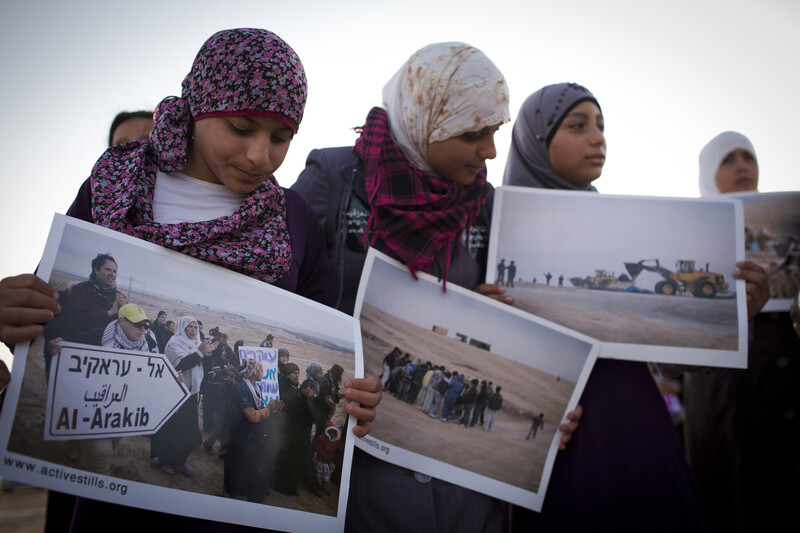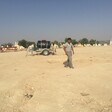The Electronic Intifada 22 May 2012

Al-Araqib village has been destroyed 34 times since July 2010 to make way for a Jewish National Fund-sponsored forest.
ActiveStillsAfter more than three years of expert testimony, evidence and deliberations, an Israeli court recently rejected an appeal filed by Bedouin activist Nuri al-Okbi demanding that his land ownership claim to his family’s ancestral land in the village of al-Araqib be officially recognized.
“The ruling is oppressive and unjust,” al-Okbi told The Electronic Intifada. “It is also illegal; illegal because the court was completely biased towards the Israeli government, the Israeli state.”
Al-Okbi was nine years old when he and his family were forced from their homes in al-Araqib, located just north of Bir al-Saba (Beersheva) in the Naqab (Negev) desert.
“They expelled us from our land, from our house. They destroyed our houses. They dried our groves: figs, vines, pomegranates,” al-Okbi recalled.
While the residents of al-Araqib were initially told that they could move back within a few months, they soon discovered that they were forbidden to return to their land. And, like the rest of the Palestinian population that remained within the boundaries of Israel following the state’s establishment, they were subjected to military rule until 1966.
“They told us that it is only for six months, and we will be able to come back. I have a letter from the military governor; the letter is signed by the military governor and it is written in Arabic. According to the letter, we will get a piece of land in exchange for our land, until we [are allowed to] return to our [village]. From 1951 to this day, a period of about 61 years, it’s been prohibited for us to return to our land,” al-Okbi explained.
In the ruling, Sarah Dovrat, a Beersheba district court judge, relied primarily on legal precedents, ignoring much of the expert testimony and documents presented by al-Okbi’s lawyers. She found that since the land was not properly registered in 1921, when Palestine was controlled by the British Mandate, it belongs to the state today.
“We know the truth”
Al-Okbi said that he has filed an appeal to the Israeli high court (also known as the supreme court), which he hoped would overturn the ruling and recognize his land rights.
“I hope that there will be a change in the ruling of the supreme court. [But] even if the highest authority in Israel will rule that this land is not our land, we know the truth. We know the truth regarding who this land belongs to,” he said.
Before the foundation of the State of Israel, between 65,000 and 90,000 Bedouin lived in the Naqab (Negev) desert. A semi-nomadic population that relied mainly on traditional agriculture, approximately 85 percent of the Negev Bedouin were expelled from their lands in 1947-48.
By the early 1950s, only 19 of the original 95 Bedouin tribes remained in the Naqab. Additionally, 12 of these remaining tribes were forcibly displaced from their lands and confined to a restricted area in the northeastern Naqab called the Siyag (literally, “the fenced area”).
The Bedouin of al-Araqib were among those who were forcibly relocated to the Siyag, an area known for its low fertility, from which they required a special permit from Israeli military authorities to leave.
Israel also passed laws to facilitate taking control of the land, including the Absentee Property Law (1950) and the Land Acquisition Law (1953). Through these means, the state took over an estimated 93 percent of land in the Naqab.
Today, nearly 200,000 Bedouin citizens of Israel live in the Naqab. Half the population live in government-planned Bedouin townships, which suffer from widespread unemployment, crime and poverty, and which provide little to no services for their residents.
The other half lives in dozens of “unrecognized” villages. These villages don’t figure on any official maps, and are deemed illegal by the Israeli authorities. As a result, residents of these villages don’t receive basic state services like water, electricity, paved roads, health care, or schools.
Destroyed 34 times
Virtually every structure in an unrecognized village is subject to demolition, and entire villages have been razed to the ground. Al-Araqib, for instance, has been destroyed 34 times since July 2010 to make way for a Jewish National Fund-sponsored forest.
In the early 1970s, the Israeli government asked the Bedouin to file any land claims they had in the northern Negev region. As a result, approximately 3,200 claims were registered over 991,000 dunams (247,000 acres) of land.
In 2004, Israel began “counter-claiming” Bedouin land claims, which in effect put the onus on the Bedouin to prove land ownership before the courts. To date, the Israeli courts have largely legitimized the state’s position with regards to Bedouin land claims, leading to a 100 percent success rate in favor of the state.
“The state doesn’t have to prove that there were no Bedouins there and that [the land] didn’t belong to the Bedouin. The state can actually sit back in a way and hope that nobody can prove [ownership] and then automatically, by default, it goes to the state,” explained Oren Yiftachel, an Israeli professor of political geography at Ben Gurion University of the Negev in Beersheba.
More specifically, the Bedouin must prove land ownership dating back to Ottoman (1858) and British Mandate control (1921) over Palestine. Failing to prove ownership — through the use of traditional documents such as land deeds and contracts — means that the Israeli government can then classify Bedouin land as state land.
This difficult process, coupled with the state’s perfect success rate in challenging Bedouin land ownership in the Negev, has caused many Bedouin citizens to withdraw their legal claims altogether, and has left most feeling alienated and disenfranchised by the state.
Impossible to prove ownership
“[For] a vulnerable, indigenous society that didn’t have the technological means that we have today, [the process] makes it all but impossible for the Bedouin to ever prove ownership,” Yiftachel told The Electronic Intifada.
“It’s even worse than appropriation. With appropriation, you’re saying, ‘It was yours but we’re taking it.’ But here, they are saying to you: this wasn’t even yours. So it’s not even considered appropriation. [Israel is saying,] ‘It was always ours, even though we didn’t exist.’ It’s a Kafka-esque kind of situation.”
The Israeli government recently passed a law to deal with “Bedouin settlement” issues in the Naqab. The plan is widely known as the Prawer Plan, named after Ehud Prawer, the representative of the Israeli Prime Minister’s Office who drafted it.
Formulated without any input or consultation with Bedouin communities, the Prawer Plan would forcibly evict at least 30,000 Bedouin citizens from their current homes in unrecognized villages, and relocate them to government-planned townships.
The Israeli government has promoted the Prawer Plan as an attempt to modernize the Bedouin and provide them with better services. The Bedouin have flatly rejected the plan as an infringement on their basic rights and attack on their cultural traditions and connection to the land.
A recent report in the Israeli newspaper Haaretz revealed that a new Israeli police unit, with more than 200 officers, is being formed to enforce Bedouin evictions and home demolitions in the Naqab. It is expected to be operational as of August 2012 (“Israeli police establishes unit to enforce demolition of Bedouin homes,” 17 April 2012).
According to Oren Yiftachel, while appealing to the Israeli high court is important in Nuri al-Okbi’s case, he wasn’t optimistic that the court would recognize al-Okbi’s land rights, since this would set an important precedent for other Bedouin claimants.
“It will be easier for [the high court] to hang on to this kind of precedent [of denying Bedouin land claims] even though it’s in total contradiction with the evidence on the ground,” he said.
“Areas that were totally cultivated and settled were declared dead land, abandoned desert [that] doesn’t belong to anybody. This is ridiculous, but they put the Bedouins in the position that they almost cannot ever prove that they are the rightful owners of the land that they’ve been living on for generations.”
“We reject compensation”
Al-Okbi also readily admitted that the Israeli legal system is an unjust one, and that it will continue to be an uphill struggle to achieve justice in the courts.
“The law in Israel is not just,” he said. “In the text of the ruling, it says that it is unfortunate that we, the Okbis, did not accept compensation. We reject compensation, completely! We don’t want compensation. We don’t want money from Israel, we want our land.”
“We date back seven generations of working this land,” he added. “We are [for] seven generations in al-Araqib, seven generations. Why do they take my land and give it to another citizen? This is unacceptable. To take my land and give it to someone else? I want to live in a state that is not racist.”
Jillian Kestler-D’Amours is a reporter and documentary filmmaker based in Jerusalem. More of her work can be found at http:jkdamours.com.





